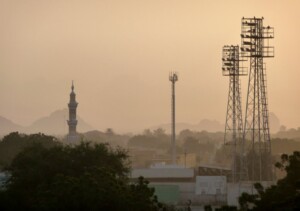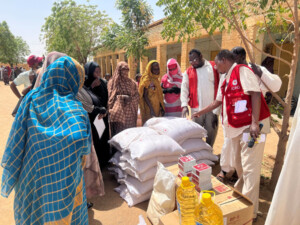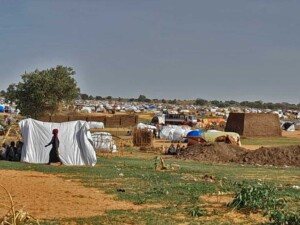Another girl raped in Darfur as herders intimidate displaced and farmers
Gunmen raped a girl, aged 13, from Murnei camp for the displaced in in Kereinik locality, West Darfur, on Friday. The girl was bringing cattle to a nearby well. Other rape incidents by herdsmen have been recorded in El Gedaref.
 A farmer collecting the remains of her harvest North Darfur (Albert González Farran/UNAMID)
A farmer collecting the remains of her harvest North Darfur (Albert González Farran/UNAMID)
Gunmen raped a girl, aged 13, from Murnei camp for the displaced in in Kereinik locality, West Darfur, on Friday. The girl was bringing cattle to a nearby well. Other rape incidents by herdsmen have been recorded In El Gedaref.
A listener told Radio Dabanga that the incident occurred south of the camp, a kilometre away, while the victim was on her way to the nearby well with her family's livestock.
A report was filed at the Murnei police station, and one of the perpetrators has been arrested in the town.
Last month, three girls aged between 6 and 9 were raped by four armed herdsmen north of Bindisi in Central Darfur.
Harassment of farmers and displaced people by herders is commonplace in Darfur. During the war, a genocide took place against indigenous farmers by militant Arab herders supported by the regime of ousted dictator Omar Al Bashir. As Janjaweed militias, they killed many African farmers. In recent years, attacks by herdsmen against Darfur’s farmers and non-Arab herding groups have continued, resulting in many deaths.
Farmer Hasan Ahmed also reported three recent cases in which girls were raped by herders in the village of Kamberos in Gala El Nahel locality in El Gedaref.
The residents of the village demand that the herdsmen will be prevented from entering their village. Ahmed explained that the shepherds release their livestock onto the farms, which leads to the destruction of agricultural crops.
The farmers demand compensation.
Herders and farmers
Attacks and intimidation by herding tribes against farmers have been a recurring phenomenon in Sudan, especially during the winter agricultural season. As the rainy season ends in September and the herders need fresh pastures in winter, they let their camels and cattle graze on farmlands that have not yet been harvested. Each year, farmers complain about livestock destroying their crops.
Farmers have frequently protested the destruction of their crops, but authorities have failed to put an end to the herders' practices. This is rooted in the fact that herding tribes were often supported by those in power, especially during the dictatorship of Omar Al Bashir.
Many Janjaweed militants have been assimilated into the Rapid Support Forces (RSF), commanded by Sovereignty Council Vice-Chairman Mohamed Hamdan ‘Hemeti’ Dagalo.









 and then
and then